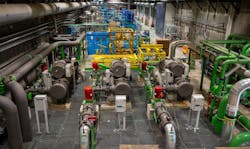ABB and CERN find 17.4% in energy saving for 800 motors
ABB and CERN, the European laboratory for particle physics, reported Feb. 29 that their research partnership has identified potential energy savings in the cooling and ventilation system at the laboratory in Geneva, Switzerland. The study included energy efficiency audits that helped find potential savings of 17.4% for a fleet of 800 motors. Conducted in 2022-23, the research led the partners to develop an energy-reduction roadmap, which identified potential energy savings of up to 31 gigawatt-hours (GWh) per year and the prevention of four kilotons of CO2 emissions.
The audits combined data from multiple sources, including digitally-connected motors, CERN’s SCADA system, and data gathered directly from their pumps, piping and instrumentation. This allowed ABB and CERN’s experts to analyze the whole system’s efficiency, gain insights, and pinpoint the motors with the best business case for energy-efficiency upgrades.
“We’re proud to cooperate with CERN, and support its ambition to conduct physics research with a low-carbon footprint by helping it achieve more energy-efficient operations of their cooling and ventilation systems,” says Erich Labuda, president of ABB’s Motion Services division. “This research project represents another step in CERN’s energy efficiency journey. As an institution with a large installed base of motors, working with CERN is a great example of how we can support in making a big impact in improving energy efficiency as part of the transition to a low-carbon society.”
Giovanni Anelli, head of CERN’s Knowledge Transfer Group, states, “The collaboration with ABB aimed at optimizing the laboratory’s cooling and ventilation infrastructure to reduce its energy consumption, and is in line with CERN’s commitment to minimize its environmental footprint, as well as to share findings publicly for a greater impact on society. We’re very happy with the final result of this research because we exceeded our goal of identifying a 10-15% energy efficiency improvement.”
Labuda adds, “Cooling and ventilation systems are a fantastic first place to look for energy efficiency upgrades. This is because they’re often overdesigned, and specified to operate at a maximum load way above the average. In fact, we found one pump motor at CERN with an energy-saving potential of 64%. It’s also important to, not just evaluate motor efficiency, but study the system as a whole, including the fans, condensers and cooling towers. This holistic approach supports the improvement of CERN’s overall energy efficiency and reliability.”
CERN’s next step is to create a roadmap for upgrading the first motors to the solutions recommended as part of the energy efficiency audit, namely IE5-rated, synchronous-reluctance motors (SynRM) with variable speed drives (VSD). These motors will also be digitally connected, enabling condition monitoring solutions to accurately monitor their health and performance to ensure maximum uptime.


